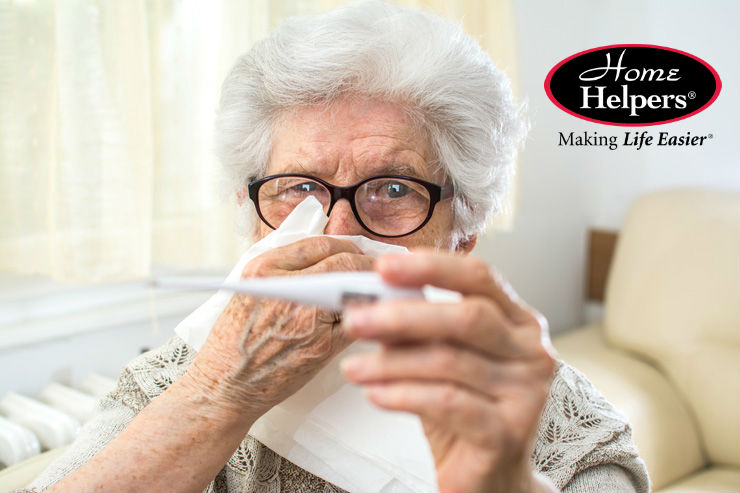It’s that time of year again where flu season is upon us. Did you know that seniors, as well as their caregivers, are more vulnerable to the flu? It’s true, but there are things you can do to protect yourself and shorten the lifespan of the illness if it does happen.
The immune system is much weaker in the elderly, making them vulnerable to contract colds and flu. The same is true for caregivers, simply due to the stress they are under. Additionally, germs can be passed back and forth simply because of the time spent together and close proximity to one another.
To help you prevent colds and flu, here are some important tips:
1. Get the flu shot.
Contrary to widespread belief, getting the flu vaccine will NOT give you the flu. It is not made with live virus, therefore cannot cause the flu. It will, however, help protect against the flu, as well as shortening the duration should you come down with influenza. Taking the flu shot will go a long way in protecting each other if one is not able to take the vaccine. Flu shots work best when administered between October and November.
2. Wash hands often
Washing hands frequently is still the best way to prevent colds and flu. You do not need special antibacterial soap, despite what you might think. It’s the friction of rubbing hands together for up to 30 seconds that actually eliminates germs, so plain soap and water works fine. Pay special attention to the back of your hands, under nails, and between all your fingers. If it’s difficult for seniors to get to the sink often, hand sanitizer can also be an effective way to keep hands clean.
3. Get some exercise.
Not only does regular exercise help keep you healthy, it also strengthens the immune system and can help you cut the duration of colds and flu in half. It may be tough for you as a caregiver to find the time to exercise, or the senior adult may not have as much physical endurance, but any amount of exercise goes a long way in preventing illness.
4. Try not to touch nose, mouth, and eyes.
Touching our face is normal and is done without even thinking about it. Germs enter the body through touching eyes and nose and mouth, especially if hands are not washed often enough.
5. Keep your environment clean.
Sanitize your environment the best you can by spraying Lysol on commonly used spaces where hands touch often. This includes doorknobs, light switches, and countertops.
Keep sponges and cleaning rags sanitized. You can do this by putting them in the microwave for 60 seconds, soaking them in bleach or putting them in the dishwasher. Sponges are a huge breeding ground for germs, so it’s best to throw them away and replace them often with new ones.
Wash sheets and bedding often in hot water and dry them on high heat.
6. Disinfect devices and cell phones.
One of the most germ-infested areas is on mobile devices and telephones, including cell phones. Keep them sanitized by wiping them down with rubbing alcohol. Disposable disinfecting wipes can also be used.
7. Don’t hang out with sick people!
This is perhaps the easiest way to avoid getting colds and flu, and still the best. Don’t be around sick people and if anyone in your house is ill, try to limit contact with them. Also, avoid hand-to-hand contact with sick people, including hugging and shaking hands.
8. Don’t travel unless absolutely necessary.
The reason colds and flu are so prevalent in the colder months is because people are stuck indoors where ventilation might be poor. Avoid being in crowded places such as airports or subway stations. Traveling by plane is one of the most common ways to get sick due to being in such tight quarters.
9. Drink lots of water!
We’ve all heard our doctors tell us to get plenty of rest and drink plenty of water. This is still one of the best ways to protect yourself against illness. Drinking mostly water is best, although hot tea can also be effective in fighting off sickness. Look for teas with immune-strengthening ingredients such as echinacea or ginger. Lemon and honey help coat the throat and bring relief to a dry cough.
10. Increase your Vitamin C intake.
Getting extra Vitamins of any kind is a good way to ward off colds and flu, but Vitamin C is especially helpful. Getting vitamins and minerals from our food is superior, but you can aim for 200mg Vitamin C supplements for both caregivers and seniors. Always ask your doctor before taking any herbal or vitamin supplements.
Finally, getting enough protein is also vital when it comes to avoiding the flu. Eat more eggs, fish, yogurts and green leafy vegetables. Meat does contain protein but can be hard on a sensitive senior’s digestive system, so getting it through dark-colored veggies and certain dairy products is best.
For more tips on staying healthy during this flu season, contact us today!

